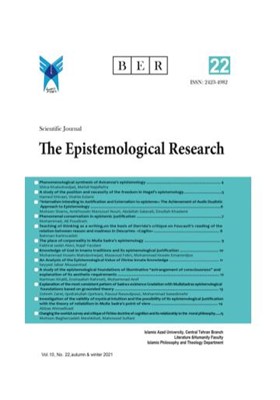An Analysis of the Epistemological Value of Divine Innate Knowledgee
Subject Areas : Epistemological researches
1 - Assistant Professor of Philosophy of Religion, Department of Islamic Philosophy and Theology, Allameh Tabataba'i University, Tehran, Iran
Keywords: Correlation, god, knowledge in presence, Instinct, innate divine knowledge,
Abstract :
Finding an epistemological basis divine for innate knowledge of God is an important issue which various theories have been proposed on. The most important theories about the nature and epistemological basis of this divine innate knowledge are: A: Innate knowledge means the clarity of the theoretical argument for the existence of God. B: There is a correlation between the desire for God and the objective existence of God. C: The concept of God is one of the innate concepts. D primordial natural knowledge is a logical self-evident proposition. E: Innate knowledge is an obvious affirmation that arises from the quality of human creation; F: Innate knowledge means knowledge in presence of God. In this article, these theories are examined and finally it is proved that only on the basis of knowledge in presence an epistemological basis for innate theology can be found and the rest of the theories and foundations have their own drawbacks. The base of the innate knowledge is that just as man finds his own existence, attributes, and subjective states, so he intuitively will be able to find the existence of God. However, this epistemological basis can also be accepted only if we say that the knowledge of God in presence does not require the unity of the knower (man) and the known (God).
ابن سینا (۱۴۰۴)، الشفاء (المنطق)، مکتبه آیه الله مرعشی، قم.
ابوترابی، احمد (۱۳۹۶)، علم حضوری فطری به خدا از منظر عقل و نقل، فصلنامه حکمت اسلامی، سال ۴ شماره ۲، ص ۹-۳۷.
جوادی آملی، عبدالله (۱۳۹۰)، تبیین براهین اثبات خدا، مرکز نشر اسراء، قم.
سبحانی، جعفر (۱۳۸۶)، مدخل مسائل جدید در علم کلام، موسسه امام صادق، قم.
شاه آبادی، محمد علی (۱۳۶۰)، رشحات البحار، نهضت زنان مسلمان، تهران.
شیخ اشراق (۱۳۷۵)، مجموعه مصنفات شیخ اشراق، موسسه مطالعات و تحقیقات فرهنگی، تهران.
صدوق (۱۴۱۴ ه.ق.)، الاعتقادات، الموتمر العالمی للشیخ المفید، قم.
طباطبائی، سید محمد حسین (۱۳۷۱)، المیزان، اسماعیلیان، قم.
--- (۱۳۶۳)، دومین یادنامه علامه طباطبایی، انجمن حکمت و فلسفه، تهران.
عمر بن سهلاوان ساوی (۱۳۸۳)، البصائر النصیریه، شمس تبریزی، تهران.
فخررازی (۱۴۱۱ه.ق)، المباحث المشرقیه، بیدار، قم.
فیاضی، غلامرضا (۱۳۸۶)، تعلیقه بر نهایه الحکمه، موسسه امام خمینی، قم.
قاضی سعید قمی (۱۴۱۵ ه.ق.)، شرح توحید الصدوق، وزارت فرهنگ و ارشاد اسلامی، تهران.
محمد رضایی، محمد (۱۳۸۸)، پژوهشی در باب برهان اجماع عام و مقایسه آن با برهان فطرت، فصلنامه پژوهش های فلسفی و کلامی، شماره ۴۰، ص ۱۰۹-۱۲۵.
مصباح یزدی، محمد تقی (۱۳۸۶)، آموزش فلسفه، سازمان تبلیغات اسلامی، تهران.
مطهری، مرتضی (1383) ، مجموعه آثار ،تهران، انتشارات صدرا.
ملاصدرا (۱۳۵۴)، المبدا و المعاد، تهران، انجمن حکمت و فلسفه ایران.
--- (۱۹۸۱)، الحکمه المتعالیه فی الاسفار العقلیه الاربعه، بیروت، دار احیاء التراث.
موسوی خمینی، سید روح الله (۱۳۹۱)، شرح حدیث جنود عقل و جهل، موسسه امام خمینی، تهران.
Edwards, Paul (1976), Encylopedia of Philosophy, ed., By Donald M, Borchert, Thomson Gale, USA.
Rene Descartes (2006), Meditations, Objections, and Replies, Hackett Publishing Company.
_||_

